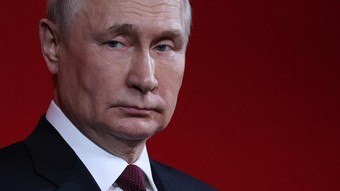Russia says Putin will not go to the G-20 because of “other commitments”; The West sees absence as a sign of isolation
3 min read
Russian President Vladimir Putin will not travel to the leaders’ meeting G20 (the group that includes the 19 largest economies in the world, plus the European Union) in Bali next week – announced the Kremlin, which reported that the leader’s agenda “does not allow” his participation, as he will be busy with other commitments.
“The decision (not to leave) was made by the head of state personally and is explained by his agenda and the need to be in Russia,” said Dmitry Peskov, a spokesman for the Russian presidency.
The Kremlin told Indonesian news agencies that the Russian delegation to Indonesia would be headed by Foreign Minister Sergei Lavrov, confirming what was announced by the Russian embassy in Jakarta to AFP.
For several months, analysts have speculated whether or not Putin will attend the meeting, which will be held from November 15-16 on the Indonesian tourist island of Bali. This will be the largest G20 meeting since the start of the Covid-19 pandemic in late 2019.
Putin’s absence highlights Russia’s increasing isolation on the international stage since its forces invaded Ukraine in late February of this year.
The Russian position in Ukraine appears complicated, after the announcement last Wednesday (9) of Withdrawal of his forces from Khersona strategic regional capital they occupied in southern Ukraine.
Western countries criticize the Russian attack and support Ukraine. Even Moscow’s allies like India and China have openly criticized Putin.
By not traveling to Bali for a meeting of the planet’s 20 major economies, Putin avoids a cold reception and potential discomfort, such as dismissing the common traditional image of leaders.
US President Joe Biden, who once called Putin a “war criminal,” said he had no intention of meeting his counterpart in Bali, even if the Russian president attended the event.
The head of Russian diplomacy withdrew from a meeting of G-20 foreign ministers in Bali in July after Western criticism of the invasion of Ukraine.
Indonesia has come under heavy pressure from Western powers to exclude Russia from the meeting in response to the Ukraine war, but the host country has defended its neutrality in the event.
Indonesian President Joko Widodo said Putin would be invited to the meeting and announced in August that the invitation had been accepted.
Jakarta also invited Ukrainian President Volodymyr Zelensky for the virtual participation, even though the country is not a member of the G20. A spokesman for the Executive Command, Serhiy Nikiforov, said that the Ukrainian leader is going to the summit and that he “most likely” will speak in a hypothetical manner.
Analysts note that Putin’s absence will affect the meeting, preventing the possibility of finding solutions to the conflict in Ukraine and its global economic consequences.
Western powers have imposed heavy sanctions on Moscow, but the governments’ approach to Putin is different.
Since the start of the war, for example, Biden has avoided any contact with his Russian counterpart, while French President Emmanuel Macron has warned of Putin’s complete isolation on the international stage.
Moreover, while sanctions affected Russia, other powers continued their relations with Moscow. India and China, both present in the G-20, have increased their purchases of Russian oil.
Divisions over the situation in Ukraine will overshadow the G-20 talks, which have sparked a global food crisis and driven up energy prices.
Until then, all G-20 meetings ended without joint statements, and no different outcome is expected this time, in a scenario of blame-shifting for global tensions.

“Devoted food specialist. General alcohol fanatic. Amateur explorer. Infuriatingly humble social media scholar. Analyst.”




